Occupy Central
Occupy Central is a civil disobedience movement which began in Hong Kong on September 28, 2014. It calls on thousands of protesters to block roads and paralyse Hong Kong's financial district if the Beijing and Hong Kong governments do not agree to implement universal suffrage for the chief executive election in 2017 and the Legislative Council elections in 2020 according to "international standards." The movement was initiated by Benny Tai Yiu-ting (戴耀廷), an associate professor of law at the University of Hong Kong, in January 2013.
Umbrella Movement
The Umbrella Movement (Chinese: 雨傘運動; pinyin: yǔsǎn yùndòng) is a loose political movement that was created spontaneously during the Hong Kong protests of 2014. Its name derives from the recognition of the umbrella as a symbol of defiance and resistance against the Hong Kong government, and the united grass-roots objection to the decision of the Standing Committee of the National People's Congress (NPCSC) of 31 August.
The movement consists of individuals numbering in the tens of thousands who participated in the protests that began on 28 September 2014, although Scholarism, the Hong Kong Federation of Students, Occupy Central with Love and Peace, groups are principally driving the demands for the rescission of the NPCSC decision.
The movement consists of individuals numbering in the tens of thousands who participated in the protests that began on 28 September 2014, although Scholarism, the Hong Kong Federation of Students, Occupy Central with Love and Peace, groups are principally driving the demands for the rescission of the NPCSC decision.
POST OCCUPY CENTRAL - DAY 43:
Full coverage of the day’s events
Tong extends reforms olive branch

Civic Party lawmaker Ronny Tong Ka-wah (湯家驊) says he is prepared to lobby the pan- democrats to support political reforms if Beijing pledges to introduce universal suffrage to the Legislative Council by 2020 and democratize the chief executive nomination committee by 2022.
Tong said he is willing to persuade the pan-democratic lawmakers and the public to support Beijing's proposals.
But Beijing will have to explain what will happen if they shelve the current election reform framework set out by the National People's Congress' Standing Committee last August.
He said Beijing has to remove the functional constituencies in the 2020 elections to have a Legco returned by genuine universal suffrage.
It must also have a nomination committee with a lower threshold for entry in 2022.
"If we can see a solid political prospect, I think Hongkongers and the pan- democrats can consider it when you tell us to `pocket the framework for now,"' Tong told a radio program yesterday.
But Basic Law Committee member and University of Hong Kong law professor Albert Chen Hung-yee said it is not possible for Beijing to make such a pledge, as there is no "legal basis or mechanism" for the central government to make any guarantee at this stage.
"The question of what electoral model will be adopted in 2020 for Legco and in 2022 for the CE election can only be decided in accordance with the so- called five-step procedure," Chen said.
"The five-step procedures in dealing with elections in 2020 and 2022 can only be initiated after the CE has been elected in 2017. So I don't see any legal mechanism which can allow the central government to guarantee at this stage that the election for Legco in 2020 or the election for CE in 2022 will be conducted according to a particular model."
Separately, a group of 50 young lawyers announced they were setting up a Progressive Lawyers Group, aimed at upholding the rule of law and promoting democracy.
The group said in its founding declaration: "In these times where falsehoods are now readily peddled as truths, we stand united as barristers and solicitors in the upholding of the rule of law, judicial independence, democracy, human rights, freedoms and justice. As legal professionals, we will use various means to spread these fundamental values in society and in local communities."
沒有留言:
張貼留言